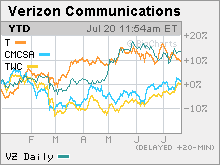Copper vs. cableTelcos and cable companies both want to be your phone, TV and Internet service provider. Investors are betting on the Bells for now, but will that last?NEW YORK (CNNMoney.com) -- The big cable companies and the telco giants are engaging in a battle for your living room. At stake are the dollars you spend on your phone, television and Internet access service. This skirmish has played out on Wall Street as well. And so far this year, the Bells are beating the cable companies handily.
Shares of Dow components AT&T (Charts, Fortune 500) and Verizon (Charts, Fortune 500) are up 11 percent and 13.5 percent this year while shares of the top two cable firms, Comcast (Charts) and Time Warner Cable (Charts), which is a majority owned subsidiary of CNNMoney.com's parent company Time Warner (Charts, Fortune 500), have gained just 3 percent and 1 percent respectively. Time Warner Cable began trading as a separate stock on a so-called "when issued" basis in January and made its formal debut in early March. With all four companies set to report their latest financial results in the next two weeks, will the telecoms continue to outperform cablers? AT&T, Comcast and Time Warner Cable are all expected to post robust gains in profits and earnings for the second quarter but a lot of this growth is driven by acquisitions. Ma Bell, which will report its second quarter results on July 24, completed its purchase of BellSouth in December. Comcast and Time Warner Cable teamed up in a deal to split up the assets of bankrupt cable provider Adelphia Communications earlier this year. Comcast's earnings are due out on July 26 while Time Warner Cable will report its results on August 1. Verizon, however, is expected to report an earnings decline of 3 percent and revenue increase of just 1.3 percent for the second quarter. It will release its results on July 30. The stock did get a lift recently due to speculation that British telecom Vodafone, which is a minority owner in Verizon Wireless, was considering a takeover of Verizon. Vodafone has denied the rumors. Despite the sluggish growth projection for Verizon, Cowen & Co. analyst Thomas Watts is predicting solid results in this quarter and the next few quarters for Verizon on other metrics. In a recent research note, he thinks the company is doing a good job of getting customers to sign up for newer services, most notably its FiOS video product that competes most directly with cable. "[Verizon is] focused on transforming its revenue to include a greater proportion of higher growth services, such as wireless, broadband, and video, and a decreasing percentage from traditional telephony," Watts wrote in his report. Watts also wrote that AT&T should benefit in the second quarter from healthy increases in digital subscriber line (DSL) Internet access customers as well as strong demand for AT&T's wireless services. Although sales of Apple's (Charts, Fortune 500) iPhone, which AT&T is the exclusive carrier for in the U.S., won't have a huge impact on second quarter sales since the phone was released just days before the quarter ended, Watts wrote that AT&T may have added as many as 200,000 new subscribers in the quarter due to the iPhone and that this bodes well for the rest of the year. But another analyst thinks that the cable companies have an advantage over the telcos in getting more of their customers to sign up for new services. For AT&T and Verizon, rolling out video is still a new and highly costly proposition. The cable firms, however, already have a strong presence in video, phone and Internet access. "Cable's business model has long since shifted from growing its video subscriber base to, instead, selling more services to the customers they already have," wrote Sanford C. Bernstein & Co. analyst Craig Moffett in a recent research report. To that end, Moffett predicts that both Comcast and Time Warner Cable will both report that their monthly average revenue per user, or ARPU, will exceed $100 per customer in the quarter, a sign that the companies are in fact getting more and more subscribers to add new services. Fellow cable company Cablevision (Charts, Fortune 500), which is in the process of being taken private by its founders, already has crossed this ARPU milestone, a measure that Moffett calls the "100 club." Spencer Wang, an analyst with Bear Stearns, wrote in a report previewing Comcast's results that he believes it is possible that the company will raise its full-year guidance for net new revenue generating units or RGUs, a fancy way of saying how many customers it is adding after factoring in how many it has lost, from 6.5 million to more than 7 million. Still, another analyst said that the two big Bells and the two largest cable firms may face a tough time generating the amount of subscriber growth that Wall Street is hoping for since competition is so intense. "Cable companies are taking share on voice but seeing pressure on video and it's the other way around with the phone companies. They are losing some ground in voice but gaining in video," said Qaisar Hasan, an analyst with Buckingham Research. Hasan added that investors will be paying close attention to how much the four companies plan to spend on capital expenditures this year and next as they rollout new services and upgrade existing systems. He said capital expenditures could hurt profit margins and with that in mind, he believes all four stocks are fully valued right now. Analysts quoted in this story do not own shares of the companies mentioned and their firms have no investment banking relationships with them. The reporter of this story owns shares of Time Warner through his company's 401(k) plan. |
Sponsors
|

